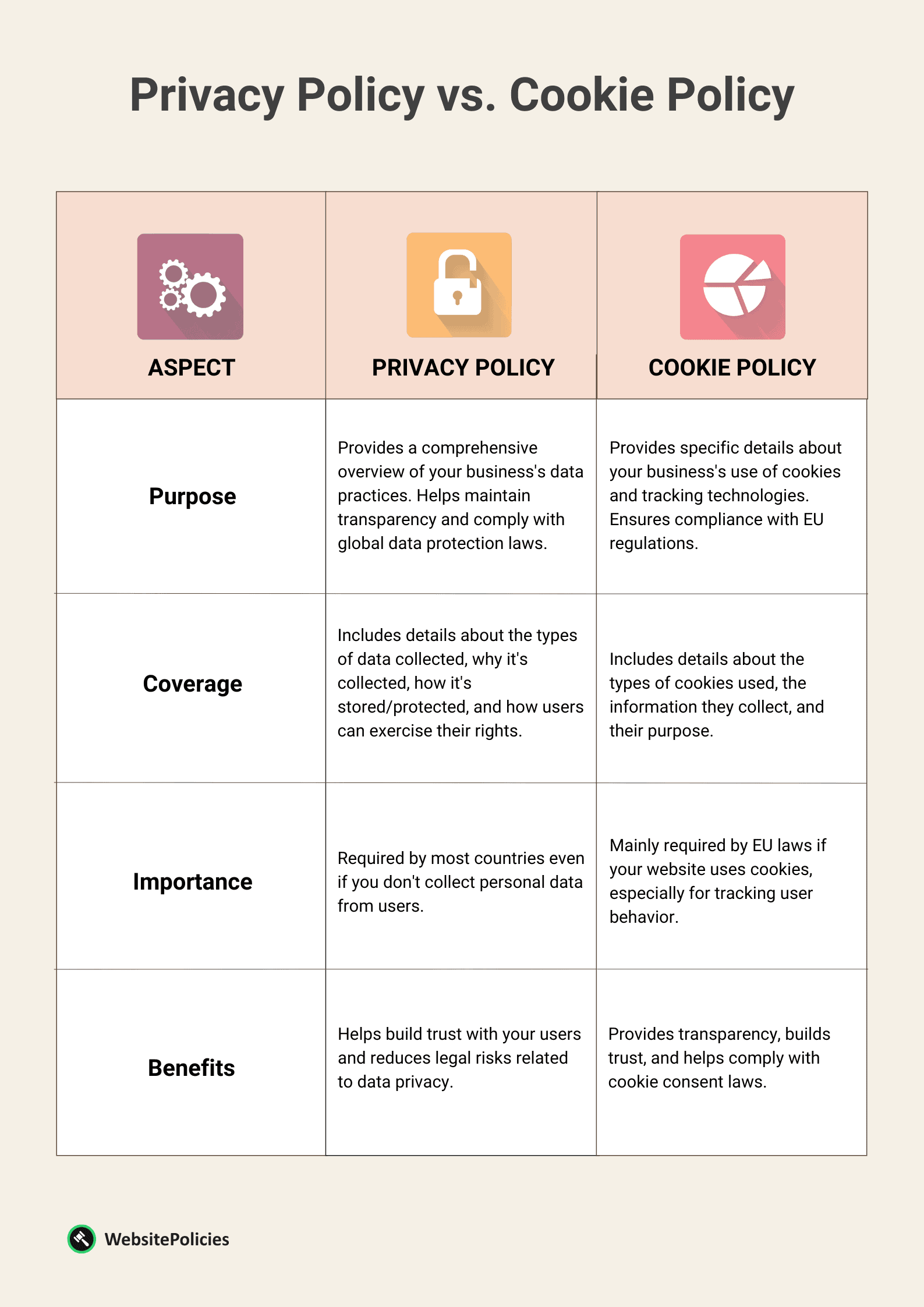Navigating the world of online privacy can be complex, but it’s incredibly important, especially for business owners. Have you ever found yourself pondering over the nitty-gritty of privacy policy vs cookie policy? It’s more than just legal jargon.
In simple terms, your privacy policy explains how you protect and manage user information, while your cookie policy outlines how your website uses cookies to enhance the user experience.
Each serves a unique purpose, but together they create a comprehensive approach to online data privacy. Let’s shed some light on their importance and how they can help build trust with your users.
- A privacy policy outlines how user data is managed, building trust by demonstrating transparency and legal compliance.
- A cookie policy explains how a website uses cookies for personalization, tracking, and advertising, promoting transparency and trust.
- Keeping privacy and cookie policies separate aids user understanding by providing detailed explanations for each aspect of data handling.
Table of Contents
PRO TIP: Don’t waste your time and take the guesswork out of the legal jargon with this personalized cookie policy generator trusted by over 200,000 businesses.
What is a Privacy Policy For?
A privacy policy is a legal document that describes how you collect, use, disclose, and manage your user’s personal data. It’s important for your business because it assures your users that their personal information is being handled responsibly.
When your users interact with your website or app, they’re often sharing their personal information – things like their names, email addresses, and potentially even payment details.
Now, imagine you’re a user: wouldn’t you want to know how all that data is used? That’s where the privacy policy comes in. It outlines all these details, so users can feel safe knowing their information is being managed in a transparent and secure manner.
Your privacy policy can also show your users that your business complies with the relevant data protection laws, which, let me tell you, is a big deal in many parts of the world today. It builds trust, and in the world of online business, trust is golden.
Takeaway: A privacy policy is an essential legal document that explains how personal data is collected, used, and managed, reassuring users their info is handled responsibly and building trust.
ALSO READ: Get a Head Start With This Privacy Policy Template
What is a Cookie Policy For?
A cookie policy is a document that provides detailed information about how your website uses cookies and other tracking technologies. It’s designed to inform your users about the types of cookies used, the information they track, and the purpose of using them.
Now, you might be wondering what those cookies are. Well, not the tasty ones we eat! In the digital world, cookies are tiny files that your website stores on your user’s devices when they visit your site.
They help your website remember things about your user’s visit, like their preferred language or items in their shopping cart, making your user’s experience more personalized and efficient.
But it’s not all about improving your user experience. Cookies also play a big role in advertising. They track your user behavior across the web, helping your business target your advertising more effectively.
A cookie policy is important because it provides transparency about your business practices. your users have a right to know what information is being collected about them and why.
A well-written cookie policy not only helps you adhere to legal requirements but also boosts trust between your business and your users. Being open about your cookie use can go a long way in building a strong and trusting relationship with your users.
Takeaway: A cookie policy explains the website’s use of cookies, helping users understand tracking, personalization, and advertising. It also helps build transparency and trust.
ALSO READ: Download This Cookie Policy Template for Your Website
Privacy Policy vs Cookie Policy Comparison Chart
Here’s a quick comparison table for easy reference:

Why Are Privacy Policy and Cookie Policy Separate?
Privacy policy and cookie policy are often separate because they serve distinct, though related, purposes. Each policy focuses on a specific aspect of data handling, providing clarity and transparency in their respective areas.
Cookies represent just one of the many ways you might collect and use personal data, they warrant their own policy. This separation allows for a more detailed explanation of your cookie practices, which would be too specific and extensive for the broader privacy policy.
Plus, keeping these policies separate can make it easier for your users to understand. Rather than sifting through one long boring document, your users can go straight to the policy that is more likely to address their concerns.
PRO TIP: Keeping the policies separate is all about making things clearer and easier for your users, which, in turn, helps increase trust and transparency between your online business and your users.
Frequently Asked Questions
Why do businesses need a privacy policy?
A privacy policy is a legal document outlining how a business collects, uses, discloses, and manages users’ personal data. It’s important as it assures users their information is being handled responsibly.
Why do businesses need a cookie policy?
A cookie policy provides detailed information about how a website uses cookies and other tracking technologies. It’s important because it makes business practices transparent and helps comply with legal requirements.
What is the main difference between a privacy policy and a cookie policy?
A privacy policy explains how personal data is managed, while a cookie policy outlines how a website uses cookies to enhance user experience and support advertising strategies.
Why are privacy and cookie policies usually separate documents?
They serve distinct, though related, purposes. Each policy focuses on a specific aspect of data handling. Separation allows for a more detailed explanation of practices and easier comprehension for users.



